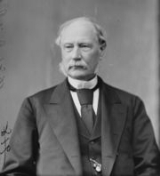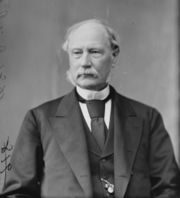
David Field
Encyclopedia

Civil procedure in the United States
Civil procedure in the United States consists of the rules of civil procedure that govern procedure in the federal courts, the 50 state court systems, and in the territorial courts. Like much of American law, civil procedure is not reserved to the federal government in the Constitution...
. His greatest accomplishment was engineering the move away from common law pleading
Pleading
In law as practiced in countries that follow the English models, a pleading is a formal written statement filed with a court by parties in a civil action, other than a motion...
towards code pleading, which culminated in the enactment of the Field Code in 1850 by the state of New York.
Early life and education
He was born in Haddam, ConnecticutHaddam, Connecticut
Haddam is a town in Middlesex County, Connecticut, United States. The population was 7,157 at the 2000 census. The town was also home to the now decommissioned Connecticut Yankee Nuclear Reactor.-Geography:...
. He was the oldest of the eight sons and two daughters of the Rev. David Dudley Field I, a Congregational minister and local historian, and Submit Dickenson Field. He graduated from Williams College
Williams College
Williams College is a private liberal arts college located in Williamstown, Massachusetts, United States. It was established in 1793 with funds from the estate of Ephraim Williams. Originally a men's college, Williams became co-educational in 1970. Fraternities were also phased out during this...
in 1825 and settled in New York City
New York City
New York is the most populous city in the United States and the center of the New York Metropolitan Area, one of the most populous metropolitan areas in the world. New York exerts a significant impact upon global commerce, finance, media, art, fashion, research, technology, education, and...
, where he studied law. After his admission to the bar
Admission to the bar
An admission to practice law, also called admission to the bar, is acquired when a lawyer receives a license to practice law. Becoming a lawyer is a widely varied process around the world. Common to all jurisdictions are requirements of age and competence; some jurisdictions also require citizenship...
in 1828, he rapidly won a high position in his profession.
In 1829, Field married Jane Lucinda Hopkins, with whom he had three children: Dudley, Jeanie, and Isabella. After his wife's death in 1836, Field remarried twice, first to Harriet Davidson (d. 1864) and second to Mary E. Carr (d. 1874). The eldest child, Dudley Field, followed in his father's footsteps and studied law. He was made a partner in his father's practice in 1854.
Over the next few years, Field became convinced that the common law
Common law
Common law is law developed by judges through decisions of courts and similar tribunals rather than through legislative statutes or executive branch action...
in America, and particularly in New York
New York
New York is a state in the Northeastern region of the United States. It is the nation's third most populous state. New York is bordered by New Jersey and Pennsylvania to the south, and by Connecticut, Massachusetts and Vermont to the east...
state, needed radical changes in the unification and simplification of its procedure. In 1836, he went to Europe for a thorough investigation of the courts, procedure, and codes of England, France and other countries. He then returned to the US and labored to bring about a codification of its common law procedure.
Several of his siblings also accomplished great things. Among his brothers were Stephen Johnson Field
Stephen Johnson Field
Stephen Johnson Field was an American jurist. He was an Associate Justice of the United States Supreme Court of the United States Supreme Court from May 20, 1863, to December 1, 1897...
, a U.S. Supreme Court Justice, Cyrus Field, the millionaire investor and creator of the Atlantic Cable, and Rev. Henry Martyn Field
Henry Martyn Field (minister)
Henry Martyn Field was an American author and clergyman.Brother of Cyrus West Field, David Dudley Field II, and Stephen Johnson Field, he was born at Stockbridge, Massachusetts; he graduated at Williams College in 1838, and was pastor of a Presbyterian church in St Louis, Missouri, from 1842 to...
, a prominent clergyman and travel writer.
Dedication to codification
For more than 40 years, every moment that Field could spare from his extensive practice was devoted to his codification project. He began by systematic publication of pamphlets and articles in journals and magazines outlining his proposed reforms. However, for some years he met with a discouraging lack of interest. He testified about codification before successive legislative committees. In 1846, Field published a pamphlet, "The Reorganization of the Judiciary", which influenced the New York State Constitutional Convention of that year to report in favor of a codification of the laws. In 1847 he finally had a chance to put his ideas into official form when he was appointed head of a state commission to revise court procedure and practice. The first part of the commission's work, a portion of the code of civil procedure, was reported and enacted by the legislature in 1848. By January 1, 1850, the New York state legislature had enacted the complete Code of Civil Procedure, subsequently known as the Field Code since it was almost entirely Field's work.The new system abolished the distinction in forms of procedure between an action at law (a civil case
Lawsuit
A lawsuit or "suit in law" is a civil action brought in a court of law in which a plaintiff, a party who claims to have incurred loss as a result of a defendant's actions, demands a legal or equitable remedy. The defendant is required to respond to the plaintiff's complaint...
demanding monetary damages) and a suit in equity (a civil case demanding non-monetary damages). Rather than having to file separate actions, a petitioner could from now on file only one single action. Eventually Field's civil procedure code was, with some changes, adopted in 24 states. The new New York state criminal code was adopted in 18. Both influenced reform in England and several of her colonies.
In 1857 Field became chair of another state commission, this time for the systematic codification of all of New York state law except for those portions already reported upon by the Commissioner of Practice and Pleadings. In this work he personally prepared almost the whole of the political and civil codes. The codification, which was completed in February 1865, was adopted only in small part by the state, but it served as a model after which most of the law codes of the United States were constructed. In 1866 he proposed to the British National Association for the Promotion of Social Science a revision and codification of the laws of all nations.
For an international commission of lawyers he prepared Draft Gistlines of an International Code (1872), the submission of which resulted in the organization of the international Association for the Reform and Codification of the Laws of Nations, of which he became president.
Politics
Field was originally an anti-slavery Democrat, and he supported Martin Van BurenMartin Van Buren
Martin Van Buren was the eighth President of the United States . Before his presidency, he was the eighth Vice President and the tenth Secretary of State, under Andrew Jackson ....
in the Free Soil campaign of 1848. He gave his support to the Republican Party in 1856 and to the Lincoln Administration throughout the American Civil War
American Civil War
The American Civil War was a civil war fought in the United States of America. In response to the election of Abraham Lincoln as President of the United States, 11 southern slave states declared their secession from the United States and formed the Confederate States of America ; the other 25...
. After 1876, however, he returned to the Democratic Party, and from January to March 1877 served out in the US House of Representatives the unexpired term of Smith Ely, who had been elected mayor of New York City. During his brief Congressional career he delivered six speeches (all of which attracted attention), introduced a bill in regard to the presidential succession, and appeared before the Electoral Commission
Electoral Commission (United States)
The Electoral Commission was a temporary body created by Congress to resolve the disputed United States presidential election of 1876. It consisted of 15 members. The election was contested by the Democratic ticket, Samuel J. Tilden and Thomas A. Hendricks, and the Republican ticket, Rutherford B....
in Samuel J. Tilden
Samuel J. Tilden
Samuel Jones Tilden was the Democratic candidate for the U.S. presidency in the disputed election of 1876, one of the most controversial American elections of the 19th century. He was the 25th Governor of New York...
's interest during the highly controversial presidential election of 1876
United States presidential election, 1876
The United States presidential election of 1876 was one of the most disputed and controversial presidential elections in American history. Samuel J. Tilden of New York outpolled Ohio's Rutherford B. Hayes in the popular vote, and had 184 electoral votes to Hayes's 165, with 20 votes uncounted...
. He died in New York City in 1894.
External links
- Field Family Letters at Syracuse University
- Mr. Lincoln and New York: David Dudley Field
–

